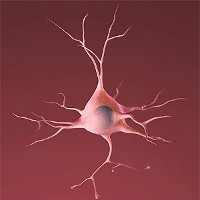The drug company Novartis today released results of a clinical trial that shows patients with multiple sclerosis taking its drug fingolimod — marketed under the name Gilenya — had fewer relapses and lower brain volume loss, including among patients who switched from a competing drug. The findings are expected to be delivered today at a meeting of the European Neurological Society in Prague, Czech Republic.
Multiple sclerosis (MS) is a disease in which the nerves do not function properly and people may experience weakness, numbness, loss of muscle coordination, and problems with vision, speech, and bladder control. Fingolimod is a drug taken once a day to prevent episodes of symptoms and slow the worsening of disability in patients with relapsing forms of MS, where the symptoms flare up from time to time. Fingolimod is in a class of medications called sphingosine l-phosphate receptor modulators, which work by decreasing the action of immune cells that may cause nerve damage.
Novartis tested fingolimod in a phase 3 clinical trial to test the efficacy and safety of the drug with some 1,300 patients at 141 locations, against a competing compound, interferon-beta-1a, which is marketed under the name Avonex. The initial study lasted 12 months, but an extension of the study tracked the original test group, plus patients who switched from interferon-beta-1a, for up to 4.5 years.
The results showed patients taking fingolimod in the core 12 month study had a lower annualized relapse rate than patients taking interferon-beta-1a. Patients who continued taking fingolimod during the extension maintained the low relapse rate during that period. These patients also registered lower brain atrophy rates throughout the study, as measured by assessing brain volume loss, which is considered a predictor of long-term disability.
Patients who switched from interferon-beta-1a to fingolimod in the extension phase showed lower relapse rates when taking fingolimod, as well as a slowing of brain atrophy following the switch. All patients treated with fingolimod in the extension phase, regardless of original treatment in the core study, showed a comparable percentage of patients free from disease activity, as measured by MRIs, by the end of the study.
The Novartis research team says fingolimod was generally well-tolerated in both the core study and the extension period. The most common adverse events reported in the trial were were nasopharyngitis, headache, and upper respiratory tract infections. Switching from interferon-beta-1a to fingolimod did not reveal any new or unexpected safety concerns.
Read more:
- Software Developed to Generate Neural Brain Maps
- Lycera Corp., Merck to Partner on Autoimmune Drugs
- FDA Approves Novartis Multiple Sclerosis Drug
* * *


 RSS - Posts
RSS - Posts
[…] sciencebusiness.technewslit.com – Today, 2:26 AM […]
[…] Trial Shows Long-Term Benefit of Multiple Sclerosis Drug […]